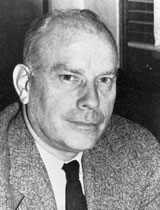Volume 27 · Number 3 · Spring 2010
UC Protested the Internments
When the government sent Japanese Americans to the camps, many in the UC academic community objected. UC President Robert Sproul was a leading voice of protest, according to a 1982 U.S. congressional report, “Personal Justice Denied: Report of the Commission on Wartime Relocation and Internment of Civilians.”
UC Davis administrators stood by Japanese American students in the days leading up to internment. As students gathered around a radio to hear President Franklin Roosevelt give his “Day of Infamy” speech declaring war against Japan, Knowles Ryerson, dean of what was then the College of Agriculture at Davis, urged the campus to stay calm.

Knowles Ryerson, director of the Davis campus during 1937–52, urged the campus community to treat Japanese American students fairly as the
United States entered World War II. (UC Davis archival photo)
“Dean Ryerson was faced with one of the most difficult problems that he had ever encountered in the form of handling the unfortunate loyal American-Japanese students who are in attendance at this branch of the University of California,” the California Aggie reported. “He deeply feels for these students. . .”
According to the Aggie account, Ryerson expressed concern that Japanese-American students would face “accusations and slanderous remarks” from a few members of a campus community that then numbered about 2,000 students, faculty and staff.
“Dean Ryerson pointed out the true virtues of good American citizens, and that clear-thinking university students will keep in mind the ‘Bill of Rights’ and uphold them in every sense of the word.”
Two months later, Aggie editors rallied behind a Japanese American student-athlete, who at a boxing competition at Oregon State University faced “one of the cruelest jibes that has ever been taken at an Aggie student.” As the unnamed student climbed into the ring, some “would-be wit” shouted “Remember Pearl Harbor!”
“Don’t think simply because that boy is a Japanese, born in America, that he too does not regret the atrocities done at Pearl Harbor,” reads a February 1942 Aggie editorial. “He already has one of his brothers in the Army and he too will be destined for the Army soon.
“This is the case with many other loyal American-born Japanese. The Japanese on this campus have always been noted as our ‘loyal Aggies.’ They have represented the Aggies on the gridiron, in the ring, on the diamond and in the countless other sports programs here at Davis.
“Let’s not just be tolerant — let’s be decent.”
